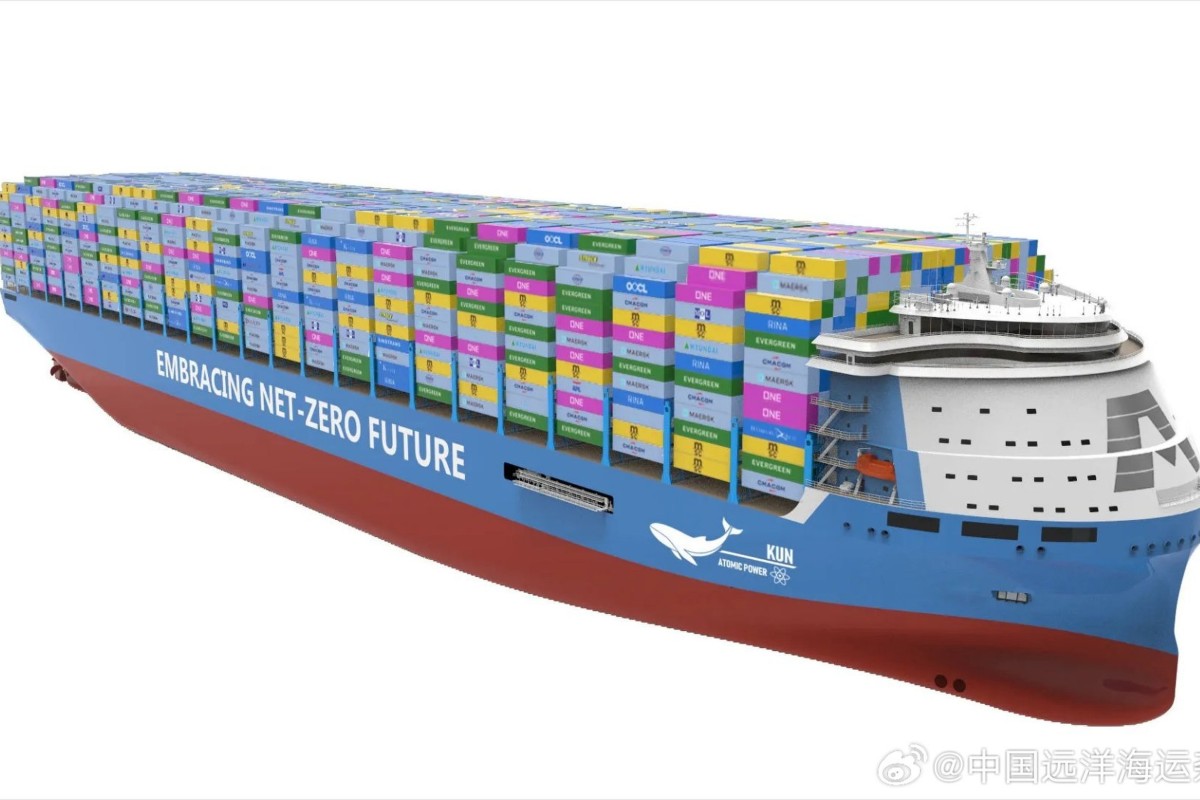China’s Nuclear-Powered Containership: A Fluke Or The Future Of Shipping?::Since China State Shipbuilding Corporation (CSSC) unveiled its KUN-24AP containership at the Marintec China Expo in Shanghai in early December of 2023, the internet has been abuzz about it. Not jus…
Nuclear powered ships are not a new thing. They’ve been around for decades. They would benefit our emission a lot. Let’s hope that they will be allowed in the ports around the world, this has been the greatest limitation so far. Convincing general population that nuclear can be safe is no easy feat.
They’re not a new idea, but the problem is that actually taking one into a port is a regulatory nightmare. Most jurisdictions have very, very strict rules around the handling of nuclear materials and would rather just say “Fuck off” than even contemplate the nightmare of getting something like into their waters with all of the proper tests and inspections completed.
This is what killed nuclear cargo ships in the past. Ports just don’t want such things coming in all the time.
We are burning and drowning so I hope here is enough of a desire to make it happen this time.
Militaries have a stellar record of not melting down their ships (fact check me someone I havent looked this up) with barely trained 18 year olds, so until we have a renewable energy storage that can power a cargo vessel around the world without taking up too much mass, this might be the best option.
I hear sails are coming back too though.
I hear sails are coming back too though.
It’s streaming companies’ fault
Thresher.
Here’s more if you want. I’m not against nuclear power but it’s maritime use is far more dangerous than power generation on land.
Here’s the summary for the wikipedia article you mentioned in your comment:
This article lists notable military accidents involving nuclear material. Civilian accidents are listed at List of civilian nuclear accidents. For a general discussion of both civilian and military accidents, see nuclear and radiation accidents. For other lists, see Lists of nuclear disasters and radioactive incidents.
If you’re somewhere near Connecticut, the first-ever nuclear powered ship got turned into a museum in Groton
Problem.
There’s a huge difference between an American carrier and a Panamanian flagged cargo hauler. Are we really ready to trust one of the shadiest industries, (there’s still ships manned by slaves out there), with nuclear reactors?
Could you imagine India letting a nuclear hauler dock after it made a port call in Pakistan? New York letting any of them dock?
And this is why I said changing the missconception that nuclear can’t be safe is hard. There are types of reactors safe by design.
Sure, no tech is foolproof, but have a look at how the molten salt reactor works. That kind of reactor doesn’t have a meltdown issue. That doesn’t mean things can’t still go wrong, but we have to do something about the emissions from these container ships burning the most crap of the fossil fuels… If we look at how many people die of deseases caused by air polution, the tiny risk of a nuclear accident looks a lot more acceptable. And that’s before we even consider how bad the climate changed in recent years.
We have to start educating ourselves and others on nuclear, because although renewables are cheaper, the energy storage for when there is no wind/sun is still very expensive and pretty crap tech(you have a phone, you know how the battery dies in 2-3 years). Also lithium won’t last forever so until we figure out something to replace it, nuclear can cover the gaps with considerably less emissions than dino juices and ancient biomass.
Most nuclear accidents aren’t melt downs. They’re steam explosions and releases of irradiated material. It’s great that they built such a failsafe for meltdowns but steam explosions have a bad habit of blowing holes in the containment system. Much less the idea of a steam explosion happening dockside or on something like a natural gas ship.
The only way it would be even close to trusted is if this Chinese ship only visits ports they can strongarm into accepting it and/or they use their military naval technology and have military personnel manning the engineering spaces.
deleted by creator
Which is ironic considering that fossil fuels have resulted in orders of magnitude more preventable deaths than nuclear. Bunker fuel is nasty stuff
Largely, this is likely a good thing. Don’t let perfect be the enemy of better (than the status quo).
I read that article and I still don’t understand what it being a fluke would matter to anything? Strange title to me.
Why do so many Chinese products have these weird alphanumeric names? They’ll build the world’s first cold fusion reactor and call it the RNG-42_Mk2.1(final).
They code pertinent information into the name so people who understand their convention can easily understand what a product is.
I’m no ship expert but it looks like the KUN-24AP has a standard capacity of 24,000 cargo containers. So I’d assume that the 24 is referring to the capacity.
If they announced a KUN-12AP I’d assume it was a boat about half the capacity.
I like nuclear power, but I wonder if it might be better to replace the internal combustion engines of cargo ships with gigantic sails instead of nuclear reactors. It might increase the duration of a route, but then it might be possible to compensate by running more, smaller ships.
Another possible innovation would be people onboard to row
deleted by creator
Just drain the seas and drive them around on big tank tracks
Yeah but where to put all that water? On the moon?
If we can make the world hot enough it’ll just become clouds
Removed by mod
You… you know that clouds… rain, right?
I thought that was bebe Jesus crying when I touch myself
Just flush it down a big toilet
Nuclear powered trains with railroads across the ocean.
A tethered ring would be cheaper, and also possible
Hey I’ve seen that movie, it was fictional. Let’s not make it real.
With the labor shortage these days, we’ll definitely have people coming forward!
Have them down below on exercise bikes like little hamsters.
This is also being tried. The first such ship set sail recently.
I’ve only heard of big kites being used to help reduce fuel consumption on cargo ships. If you have a link to an example of a cargo ship that uses the wind as its primary power source, please share it.
https://trendydigests.com/2023/12/20/wind-powered-cargo-ship-sets-sail-on-historic-voyage-2/
Keep in mind that “primary” power source isn’t going to happen. You’re not moving modern cargo loads on wind power alone. But it can provide supplementary power, reducing fuel usage.
Is there a hard theoretical limit to the capacity of a primarily wind powered ship?
My understanding is that like most things you start running into issues with a) how mass scales (so at a certain point you start adding more mass of sails to push the mass of sails you added to push the mass of…) and b) structural integrity (ie, you can’t just make a sky scraper taller by doubling all the dimensions; at some point steel just isn’t strong enough).
There’s also the issue of speed; no matter how many sails you add, the wind only goes so fast, and it doesn’t go reliably. Modern shipping has deadlines and no one is going to settle for “We got becalmed” or “We lost two months because we were tacking into headwinds the whole time”.
Yeah, I see what you mean. It’s hard to imagine what 59.3MW of sail would look like, to match the power of the Ever Given for example, but that’s equivalent to too many wind turbines to reasonably fit on such a vessel. I’m just concerned that international shipping isn’t the best use of our capacity to manufacture nuclear power reactors. Cargo ships do a lot of waiting around, so a nuclear reactor might do a better job on land replacing a coal fired plant.
As for shipping speed, maybe it would be good to just go back to those lower expectations. Maybe we shouldn’t be getting the things we need in a hurry from overseas. Overseas freight is kind of insane compared to just using emission-free power to manufacture things closer to where they’re needed instead.
I completely agree. Our approach of simply reducing emissions from our current societal and economic structures will not scale sufficiently. The problem, as always, is capitalism. We build things further away because it’s cheaper. We run international shipping on ultra tight schedules and develop systems like just-in-time logistics chains because hyper-efficiency (at the cost of intense fragility) makes more money.
These structures have to be broken, or at least heavily disincentivized, in order to make real headway in combating climate change.
The first sailing transport ship set sail recently…? Can we define “recent” lol
An interesting alternative to sails are Flettner rotors. They’re pretty much just rotating pillars, and are being tested on some cargo ships to reduce fuel consumption.
There are sailed powered logistics ships! Here’s a grain ship that just launched. There are also companies that produce inflatable or deployable sails to reduce fuel consumption in favorable winds.
Ultimately there will be a need for chemical energy or similarly dense energy to move a ship. The wind doesn’t always blow, and when it does it won’t always be in the direction you want. Nuclear is certainly an interesting option.
This comment is just classic Lemmy. Do you think customers would accept their cargo just turning up whenever, depending on what the wind is doing? Why do you think we went away from sail in the first place?
Not to mention the air draft of such a vessel, or the fact that sails interfere with loading cargo.
They can just add sails to augment the current engines. I read somewhere years ago that it was tested and found to reduce fuel consumption by a lot.
In that case, why isn’t it more common?
https://www.google.com/amp/s/www.bbc.com/news/technology-66543643.amp
I guess they’ve been working on it.
I wasn’t aware reactors using thorium were practical yet.
Yay, a tofu dreg nuclear ship.
Supposedly, a meltdown at sea is pretty low risk because you have the perfect heatsink literally everywhere around you, and its a molten salt design, which I think(?) (source: my ass) means that the fuel would at worst leak into the sea and immediately solidify back into some inert state.
and its a molten salt design, which I think(?) (source: my ass) means that the fuel would at worst leak into the sea and immediately solidify back into some inert state.
tmsr design has a freeze plug, a part of fuel that has to actively be kept below freezing temperature and if something goes wrong it melts and the fuel is dumped into a separate container where the reactivity drops to zero. It never leaves the system.
Well yeah but most accidents at sea actually happen fairly close to where there are people. At ports/canals as opposed to just in the middle of nowhere.
source: my ass
Be careful you can get stuck in the swamp!!! Lol
Yeah no fucking shot this works out.
Removed by mod














